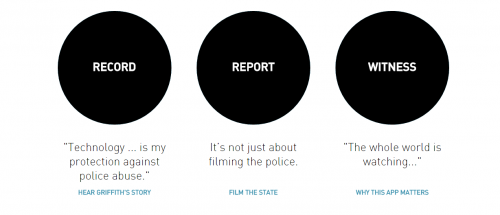
At the beginning of this month, the ACLU in California released a free mobile app that monitors police violence. The app, called Mobile Justice CA, preserves users’ footage of police encounters. Available on both Apple and Android devices, the user pushes a large “Record” button to document their own and others’ interactions with police. The content automatically transmits to the ACLU servers. The point is to preserve recorded content even if police destroy the recording device and/or delete the video. For instance, the ACLU would have maintained documentation of police detaining residents in an LA neighborhood, even after an officer smashed the cellphone of a witness recording the events.
The ACLU treats transmissions through the app as legal communications and protects the anonymity of the sender. Legal action is only taken upon the sender’s request, but the ACLU maintains the rights to the footage, meaning they can distribute it to media outlets as evidence of injustice. Branches of the ACLU in in New York, New Jersey, Oregon, and Missouri have released similar apps.
These apps are significant in their reflection of an increasingly central mode of activism: Sousveillance. They are also reflective of the structural embeddedness of the sousveilling citizen.
Sousveillance is watching from the ground up. It is the vigilant eyes of citizens upon figures of authority—individual and institutional. Sousveillance is facilitated by increasingly sophisticated and relatively inexpensive recording devices attached to the mobile phones that we carry around with us. Kari Andén-Papadopoulos names this form of protest citizen camera witnessing. The citizen camera witness points hir phone towards the action, documenting citizen-authority interactions and holding the authorities accountable.
Accountability has taken center stage over the past year with case after case of documented police violence, culminating most recently in the Baltimore uprisings and investigations into systemic problems within regional justice systems. With their mobile devices, citizens have made their grievances more difficult to ignore.
The efficacy of citizen voices has long been debated within scholarship on social movements and the Internet. With digitally mediated platforms and always-with-you mobile devices, anyone can be a director, publisher, author, and curator. But attention is a finite resource and with so many individual directors, publishers, authors, and curators—competing with established institutions of content distribution (i.e., broadcast media companies)—it may be quite difficult for the average citizen to procure an audience. In other words, we can all talk, but who will listen? The ACLU apps address this issue.
The ACLU apps recognize that citizens have important things to say, but that current social arrangements are such that individual messages need institutional channeling. The uneasy reality is that mobile technologies do not free citizens from the confines of a system, but empower them within that system. Citizen camera witnesses can only be revolutionary when their revolution takes hold through social bodies that are already systemically legitimate.
The ACLU reinforces the thin and tenuous messages recorded by citizen camera witnesses. It collects, protects, and projects these messages. It makes these messages harder to ignore. In doing so, it also reestablishes the citizen as part of an institutionally based social infrastructure that is far bigger than themselves. “We’ll take it from here,” it says, thanks for your help.
Jenny Davis is on Twitter @Jenny_L_Davis

Comments 1
ACLU Mobile Justice App: Channeling Citizen Voices » Cyborgology | James Reads — May 15, 2015
[…] ACLU Mobile Justice App: Channeling Citizen Voices » Cyborgology. […]